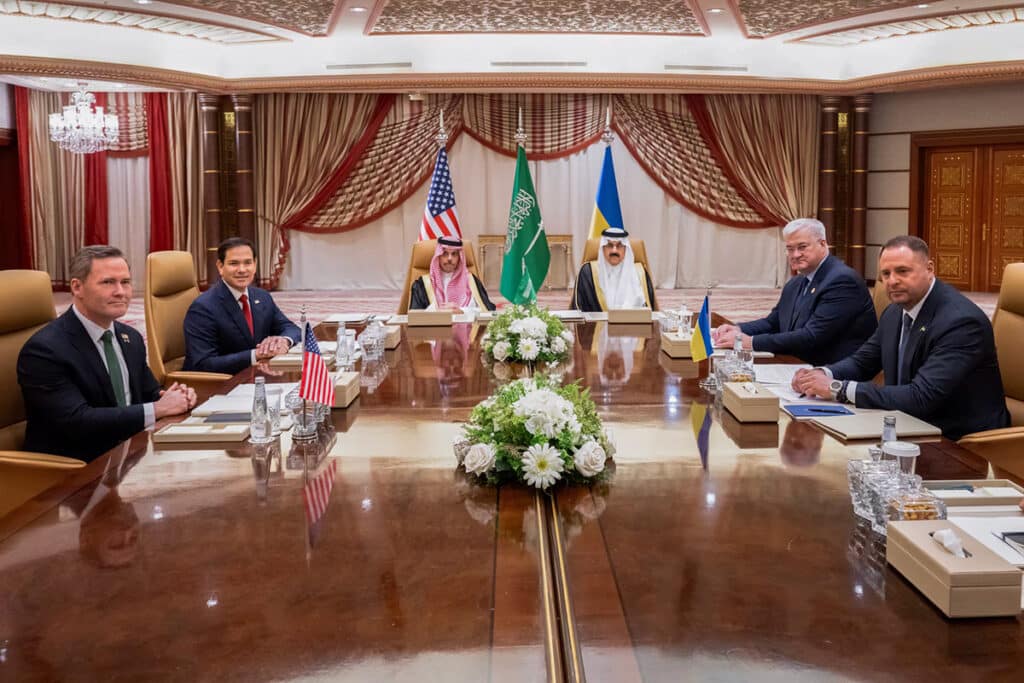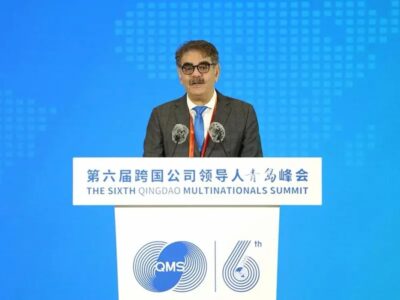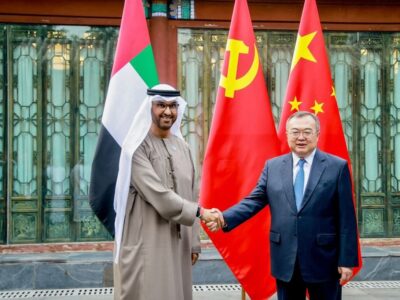Ukrainian President Volodymyr Zelenskyy’s acceptance of a 30-day ceasefire proposal marks a dramatic reversal that underscores Ukraine’s increasingly cornered position, both militarily and diplomatically, both on the battlefield and diplomatically, experts told Arabian Business.
The Saudi-brokered talks have resulted in what appears to be a significant diplomatic breakthrough, with Ukraine agreeing to “establish a complete ceasefire for 30 days” along the entire front line.
However, policy analysts warn this may represent less a path to peace than an acknowledgement of Ukraine’s diminishing leverage in a war that has dragged on for over three years.
Battlefield realities force Zelenskyy’s hand
Nicolas Michelon, Partner at Alagan.Partners, believes Trump has made a clear assessment that Ukraine cannot win this conflict. “It’s obvious that Donald Trump has decided that Ukraine cannot win,” he said.
“After nearly three years into the conflict, Ukraine has not been able to regain the lost territories. If anything, it has lost even more.”
The battlefield situation has deteriorated significantly for Ukrainian forces in recent months. Russian troops, bolstered by North Korean fighters and Chechen units, have maintained steady pressure along the front lines. The much-vaunted Ukrainian counter-offensive into Russia’s Kursk region has stalled, with thousands of troops reportedly trapped in various pockets.
“Ukraine does not have the strategic depth that Russia enjoys, Ukraine doesn’t have the industrial depth that Russia enjoys, and Ukraine does not have the demographic depth that Russia has,” Michelon noted.
These weaknesses, compounded by flagging Western support, have created conditions where a ceasefire—even one favoring Russian interests—has become increasingly attractive to Kyiv.
Saudi Arabia’s growing diplomatic clout

The choice of Saudi Arabia as the venue for these critical talks represents a significant geopolitical shift. The meeting in Jeddah, held “under the gracious hospitality of Crown Prince Mohammed bin Salman,” as the joint statement described it, highlights Riyadh’s growing diplomatic ambitions.
“Saudi Arabia’s role as host for these talks marks a significant shift in the dynamics of Middle Eastern involvement in European security issues,” said Imad Salamey, senior Middle East policy advisor at Lebanese American University. “Historically, European nations have taken more active roles in mediating such conflicts.”
This repositioning serves multiple strategic purposes for the Gulf kingdom, according to Michelon.
“Saudi Arabia is really trying to position itself on the fences as a neutral actor,” he explained. “It positions Saudi Arabia as a neutral actor, which means it increases its power overseas. It enables it to trade, to invest pretty much anywhere it wants, without carrying the stigma of belonging to one side or the other.”
The move aligns with Crown Prince Mohammed bin Salman’s broader foreign policy agenda, which has seen Saudi Arabia carefully balancing between the United States and China. Despite being invited to join BRICS, the China and Russia-led grouping of countries, Saudi Arabia has yet to formally join—a calculated position that demonstrates Riyadh’s determination to maintain neutrality in the growing global power competition.
Trump’s minerals-for-peace approach
At the heart of the ceasefire proposal lies what many analysts see as the true prize for the Trump administration: access to Ukraine’s rich deposits of critical minerals. The joint statement outlined that “both countries’ presidents agreed to conclude as soon as possible a comprehensive agreement for developing Ukraine’s critical mineral resources.”
This agreement, which had previously been rejected by Zelenskyy during his contentious White House meeting with Trump on February 28, now appears to be moving forward as part of the peace process.
According to Michelon, securing these resources was central to Trump’s strategy. The United States requires these critical raw materials to remain competitive with China in sectors like semiconductors, artificial intelligence, drone technology, and energy transition.
Ukraine’s vast reserves of rare earth minerals and other critical raw materials have long been coveted by both Western and Eastern powers. The Trump administration appears to have leveraged the country’s precarious military situation to secure a favorable economic arrangement.
From Trump’s perspective, Michelon explained, the US has been paying too much to support Ukraine without receiving adequate returns. Trump’s approach to international relations consistently seeks net gains—whether in trade, finance, or economic power.
Trump’s domestic calculations
The push for a ceasefire agreement also serves Trump’s domestic political agenda, analysts suggest. Having campaigned on promises to end foreign entanglements and reduce American military spending abroad, a deal — even an imperfect one — could be presented as fulfilling campaign pledges.
Salamey believed Trump’s pressure on Ukraine reflected both domestic political considerations and genuine security concerns. By delivering on promises to reduce American military involvement abroad, Trump strengthens his credibility with supporters while advancing strategic interests in curtailing Chinese influence.
The Feb. 28 White House meeting between Trump and Zelenskyy proved disastrous for Ukraine, with the Ukrainian president’s confrontational approach backfiring, said Michelon. Following this contentious encounter, Trump reportedly implied Zelenskyy “could lose his power” if he continued to oppose peace — a threat that may have contributed to the Ukrainian president’s rapid change in position.
Michelon noted that Trump has consistently positioned himself against what he calls the “deep state”— particularly the military-industrial complex that benefits from prolonged conflicts. This lobby thrives on wars as they necessitate larger military budgets and constant restocking of equipment and ammunition.
The diplomatic breakthrough also came shortly after the US temporarily suspended intelligence sharing and military aid to Ukraine — a move widely interpreted as pressure on Kyiv to accept American terms for negotiations.
Will Putin accept?
As US Secretary of State Marco Rubio put it, “the ball is in their court.” Russia’s response to the ceasefire proposal remains the critical unknown factor, though early indications suggest Moscow may drive a hard bargain.
Russian lawmaker Konstantin Kosachev has already stated that any agreements would be “on our terms, not American,” signaling potential resistance to the US-brokered deal.
Salamey believes that for Putin to accept a ceasefire, Ukraine or the West would need to make significant concessions. These might include guarantees that Ukraine will never join NATO and arrangements for Russian-controlled territories that ensure Moscow’s continued influence in the region. Such concessions would allow Putin to present the ceasefire as a victory or at least a strategically sound retreat.
Michelon expects Putin to demand retention of all territories Russia has taken, including not only the regions annexed since the 2022 invasion but also Crimea, seized in 2014. Beyond territorial concessions, Putin’s most fundamental demand will likely be guarantees against Ukrainian NATO membership—a central justification Moscow has used for the invasion.
A “finlandization” of Ukraine — referencing Finland’s historical neutrality during the Cold War — may be the minimum acceptable outcome for Moscow, with Putin likely to insist that Ukraine remains permanently neutral.
Notably absent from the Jeddah talks were representatives from European nations, despite their significant financial and military contributions to Ukraine’s defense. The joint statement acknowledged that “the Ukrainian delegation reiterated that European partners shall be involved in the peace process,” but their exclusion from the initial negotiations has raised eyebrows.
According to Michelon, Ukraine has been merely a pawn in a larger conflict between major powers. “Ukraine was nothing but a pawn in this conflict from day one, unfortunately, it has been sacrificed. We have to remember what a US senator said publicly: ‘We will confront Russia to the last Ukrainian’. Ukraine has been sacrificed on this altar. It’s just that now we have a new administration.”
The European Union has committed approximately €800 billion ($871bn) to rearmament in response to the perceived Russian threat, yet their absence from these crucial talks suggests a diminished role in shaping the future security architecture of their own continent.
The 30-day ceasefire, if accepted by Moscow, may offer a temporary respite from hostilities. However, experts warn that the underlying conditions — Trump’s transactional approach to foreign policy, Russia’s territorial ambitions, and Ukraine’s diminishing leverage — suggest any long-term peace agreement may come at a heavy cost for Kyiv.







